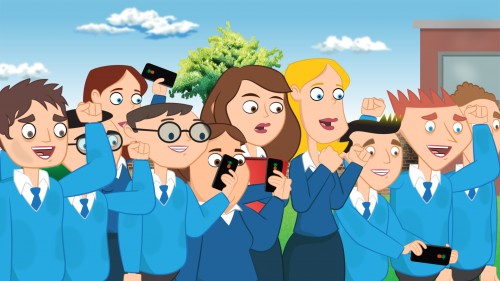Lesson 1 – My Online World
- +Curriculum Links
- SPHE strand: Myself and the wider world
SPHE strand unit: Media educationCross-Curricular approachActivity 2, in particular, could be used in a cross-curricular approach to teaching SPHE and history. The activity ties in well with teaching the following strands and topics on the history curriculum:
Working as an historian: Synthesis and communication
Story: Stories from the lives of people in the past
Life, society, work and culture in the past: Life in Ireland since the 1950s
Continuity and change over time: CommunicationsThe activity might also be used in preparation for Grandparents Week/Day. - +Resources and Methodologies
- Worksheet 1.1: My Internet.
Worksheet 1.2: Technology and safety concerns through the ages.
Materials:Colouring utensils.Methodologies: Drawing, presenting, analysing, interviewing
- +Teachers' Note
- It is important that the discussions in this lesson focus on online activities, rather than on specific online services. You should try to focus discussions on the needs that motivate students’ internet use and not the tools they use to achieve these goals. In general, children use the internet to socialise, to share media, to find information, to play games, to communicate, and to learn.
You should be aware that some of the children in your class will be on the cusp of using social networking and media sharing apps and tools for the first time. Many of them will be haggling with their parents for permission to do this. Your words may be brought home and used as part of these negotiations. In this context, it’s better to talk about “sharing photos” than “using Instagram”.
- +Activity 1.1 - My Internet
- STEP 1: Explain to students that today’s class will focus on the internet and what they use it for. This activity will allow students to share examples of best internet practice and should help inform you on their level of knowledge and experience of online tools. It will also get students to think about the role the internet plays in their lives and to reflect on their online behaviour.
STEP 2: Give students Worksheet 1.1: My Internet and ask them to fill in the screen with a drawing that shows the best thing to do on the internet. Students should be encouraged to share knowledge of internet sites that other people might find most useful.
STEP 3: When students have finished their drawings they should then present their drawings to the class. Before presenting, students should indicate the main reason why they use the internet (e.g. to socialise, to find information, to play games, to communicate, to learn etc). During their presentations students should describe what features of the internet they find to be most interesting and helpful.
- +Activity 1.2 - Technology and safety concerns through the ages
- STEP 1: In preparation for the students’ homework, have a short quiz, using the multiple choice questions contained in the worksheet below. The quiz will help students think about fears associated with new technological inventions.
STEP 2: When the quiz has been completed, give students the answers and have them tot up their scores. Then ask the students the following questions:Q. Were you surprised by any of the answers?
Q. What do the examples in the quiz tell us about how people feel about new technology?Suggested answer: The examples in the quiz show us how, often times, people worry about change and the effects that new inventions might have. The media can help create hysteria so that people develop fears of new inventions. It seems crazy that people once feared light bulbs and comics but it is actually not unusual for people to fear the unknown. The same thing happens nowadays when revolutionary new pieces of technology are developed.Q. Have you any concerns about new pieces of technology or the internet?
Q. What can you do to prevent these fears from becoming reality?Suggested answer: It is important to follow safety advice and instructions, particularly when using new products. Follow guidelines for using the internet laid down by your parents and teachers. Stop and think before posting anything online because, once something goes online, it is public and you lose control of it and how it is used. It is also important always to be respectful in online communications, just as you are in real life. Finally make responsible use of reporting tools if you encounter bullying or other material that makes you uncomfortable, online.STEP 3: Distribute Worksheet 1.2: Technology and safety concerns through the ages.
Then, ask the students to interview the oldest person they know and see regularly. The students should find out what technology was new when the older people were in 5th or 6th class. They should see if people had any strange beliefs or fears about this new technology when it first came out, just as Socrates had fears about writing or President Hayes thought no one would use the telephone. - +Extension activity using technology
- If facilities allow, have students use tablets or computers to look up and show their favourite websites to their peers in Activity 1.






